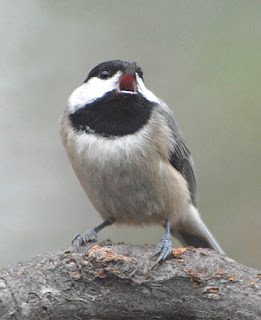Thursday, September 3, 2009
Wild Fact #991 - When Nature Calls
Chick-a-dee-dee-dee has to be one of the most famous bird calls in North America (well, at least for me growing up in Northern Ontario). Of course it is the chickadee that makes that distinguished call (the person who named the bird was not very creative). The amazing thing about this simple call is actually the complexity of this call. Yes, I know you are probably thinking that I dipped into a few too many Yukon brewed beers. Nathan, how can a simple call be complex? Well it is simple because it is just a "chick" with a few "dees" thrown in for good measure; however, it is thought to be one of the most sophisticated calls in the animal world.
The normal call of the chickadee has two to three "dees" at the end of the call (such as the one in my opening line). Now if a predator such as a hawk is perched nearby then the call will consist of four or five "dees" at the end. Even more astonishing is the fact that they can tell their predators apart. For example, if a pygmy owl or an American kestrel, which are superior at catching chickadees, is nearby then their call may consist of up to 23 "dees". This informs all of the chickadees in the area of a major threat. So, the next time you are walking through the forest, be sure to count the number of "dees" at the end of the famous chickadee call. If you get good enough at distinguishing the chickadee calls then you may qualify as being bilingual and that will look impressive on a resume.
Just as a note, there are much more complexities within the chickadee call, however, I just wanted to touch on one of the more interesting facts.
Did you find this post interesting? Did you already know this about chickadees? Do you have any stories about chickadees? Feel free to comment as I would love to read what you have to say.
Subscribe to:
Post Comments (Atom)









Nathan - I love it! I hear them everyday, but I honestly didn't know it had anything to do with threats. Next time one of the cats is sitting under their tree, I'll try to count the "dees".
ReplyDeleteKeep up the good work.
Love Aunt Bev
Thanks for stopping by and commenting, Aunt Bev. I definitely appreciate the support.
ReplyDeleteIt would be interesting to see if the chickadees actually add any extra "dees" for a cat. I am not sure if a common cat is a real threat for chickadees.
I would love to hear if they add extra "dees" in this situation.
Nathan